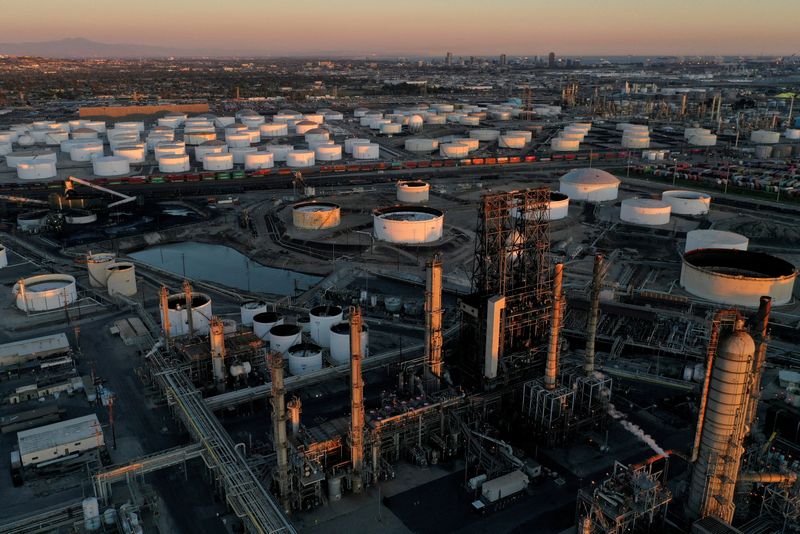Oil trades in narrow range since 2022 on OPEC+, sanctions and demand worries
By Ahmad Ghaddar and Alex Lawler
LONDON (Reuters) - Brent crude oil has been trading in a tight range of $75-$90 a barrel since late 2022 as OPEC+ cuts keep a floor under prices while sizeable spare capacity, demand uncertainty and sanctions policy prevent the market breaking higher.
After a series of gradual production increases that started in early 2021 which unwound historic cuts agreed during the coronavirus pandemic, OPEC+ announced new production cuts in October 2022 and since then has cut output further.
"OPEC+'s need to maintain stable prices, elevated hopes of falling inflation and possible rate cuts every time oil dips below $80 puts a floor under the market," PVM oil analyst Tamas Varga said.
As a result of the cuts, the Organization of the Petroleum Exporting Countries and allies, known as OPEC+, have a sizeable spare capacity, and this is limiting the upside for prices, UBS analyst Giovanni Staunovo said.
The International Energy Agency estimates spare production capacity at a historically high 5.8 million barrels per day, nearly 6% of oil consumption, including 3.3 million bpd in Saudi Arabia, 1 million bpd in the UAE, and 600,000 bpd in Iraq.
This means conflict in the Middle East, typically supportive
for prices due to a perceived greater risk of disruption to supply, has had a limited impact on oil prices this year.
"People are not even pricing in a huge risk premium for the Middle East because OPEC and Saudi Arabia can handle it," BNP Paribas (OTC:BNPQY ) analyst Aldo Spanjer said.
Uncertainty over demand growth has also limited price rises.
"Today we see a well-supplied oil market with a rather pronounced stagnation of demand in the Western world and China," Julius Baer analyst Norbert Ruecker said.
The IEA said Chinese demand contracted in April and May.
"We do not have a pronounced shortage of supply at present and the market has really moved on from the two wars that continue to rage," RBC Capital Market's analyst Helima Croft said, referring to the Israeli war in Gaza and Russia's invasion of Ukraine.
The Israel-Hamas war has not led to any supply shutdowns in the region, with the impact being limited to ships avoiding the Red Sea due to attacks by Yemen's Houthi rebels.
Western sanctions on Russia and price caps by the European Union have had a limited impact on Russian crude and fuel exports as new buyers emerged in China and India.
Source: Investing.com
